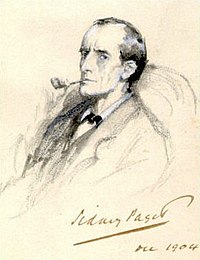
For starters, Tennyson is considered to be the great English poet of the Victorian era. He succeeded William Wordsworth (one of the great poets of the English Romantic period of literature) as poet laureate of England, a sort of poet-in-residence for the royal household and the entire nation. It was a great honor, but apart from being a royal favorite, Tennyson was widely popular with all classes of readers in his time and remains popular today.
Proof: the lines of the following poem, “Crossing the Bar,” have been often recited often by President Thomas S. Monson and are probably at least somewhat familiar to you. This poem was also sung by the Mormon Tabernacle choir at the funeral service for President Gordon B. Hinckley in the Conference Center on February 2, 2008. If you are new to poetry, try reading the poem aloud and slowly. Try to let the words paint pictures in your mind and sound music to your ears.
Crossing the Bar

Sunset and evening star
And one clear call for me!
And may there be no moaning of the bar,
When I put out to sea,
But such a tide as moving seems asleep,
Too full for sound and foam,
When that which drew from out the boundless deep
Turns again home.
Twilight and evening bell,
And after that the dark!
And may there be no sadness of farewell,
When I embark;
For though from out our bourne of Time and Place
The flood may bear me far,
I hope to see my Pilot face to face
When I have crossed the bar.
What does the poem mean? The speaker in the poem is watching an ocean sunset. The ending of the day makes him think of the ending of a life. He hopes that that event in his life will not be tragic but a joyful reunion with his Creator. One interesting thing about this poem is that Tennyson wrote it just three years before he died. This work shows a very different view of death than an outlook Tennyson held earlier in his career, which we’ll talk more about later.
Tennyson has been oft-quoted in General Conference and articles by General Authorities in Church magazines. Here are a few examples:
· President Gordon B. Hinckley often quoted these two lines from Tennyson’s poem “Sir Galahad”: “My strength is as the strength of ten, / Because my heart is pure.” He quoted these lines in at least four significant addresses: “In Search of Peace and Freedom” in the August 1989 Ensign, “Be Ye Clean” in the April 1996 General Conference, “True to the Faith” in the June 1996 Ensign, and “You can be Forgiven” in the October 2001 New Era. President James E. Faust also quoted these lines in his April 2000 General Conference address.
· President Ezra Taft Benson quoted this line from “The Coming of Arthur” in Tennyson’s Idylls of the King in an article entitled “Honor” printed in the July 1984 New Era: “Man’s word [of honor] is God in man.”
· Elder Jeffrey R. Holland references Tennyson’s poem “Ulysses” his May 2006 General Conference address entitled “Broken Things to Mend.” The poem is about Ulysses (also known as Odysseus), the Greek warrior who fought against Troy and then spent twenty years getting back to his home island of Ithaca. Tennyson’s last lines read:
 That which we are, we are,--
That which we are, we are,--One equal temper of heroic hearts,
Made weak by time and fate, but strong in will
To strive, to seek, to find, and not to yield.
Elder Holland paraphrases this last line in the middle of his talk: “Soon, with that kind of love[, the pure love of Christ], we realize our days hold scores of thoroughfares leading to the Master and that every time we reach out, however feebly, for Him, we discover He has been anxiously trying to reach us. So we step, we strive, we seek, and we never yield.” In referring to Tennyson’s “Ulysses,” Elder Holland conjures feelings of the noble heroism that is necessary for us to get through this life.
· Tennyson has also been quoted or alluded to in public addresses by President David O. McKay, President Harold B. Lee, President N. Eldon Tanner, President Boyd K. Packer, Elder Marion G. Romney, Elder Marvin J. Ashton, Elder Marion D. Hanks Bishop Vaughn J. Featherstone, and Elder A. Theodore Tuttle.
You will also recognize one of Tennyson’s works in the lyrics of hymn #215:
Ring out, wild bells, to the wild sky,

The flying cloud, the frosty light:
The year is dying in the night;
Ring out, wild bells, and let him die.
Ring out the old, ring in the new,
Ring, happy bells across the snow:
The year is going, let him go;
Ring out the false, ring in the true.
Ring in the valiant man and free,
The larger heart, the kindlier hand;
Ring out the darkness of the land,
Ring in the Christ that is to be.
We often sing this hymn for New Year’s. “Ring Out, Wild Bells” is also a part of a greater work by Tennyson called In Memoriam A. H. H. Yes, the title of the work is rather odd. The A. H. H. stands for Arthur Henry Hallam, Tennyson’s best friend who died young in 1833. Tennyson and Hallam became friends at Cambridge. Hallam’s death plunged Tennyson into a state of grieving and depression. He spent seven years writing hundreds of small poems to work out his grief. He later collected the poems and published them as In Memoriam. “Ring Out, Wild Bells” is about ringing in a New Year. Initially, in the first stanza, Tennyson is still stricken with grief over the death of his friend. He is striving to “let him die,” to let life move on even though his loved one is gone. He continues striving to get over the grief in the second stanza where he tells himself to “let him go.” In the final verse of our hymn, Tennyson finds peace, hope, and even triumph, in his feelings about death when he remembers Christ and the triumph of His resurrection.
In Memoriam is considered to be Tennyson’s great masterpiece and it is also what made him the most famous. In Memoriam was published in 1850, and in that yea
 r Tennyson was also appointed poet laureate of England. The work became even more acclaimed about a decade later. In December 1861 Prince Albert, the consort of the ruling Queen Victoria (hence why we call it the Victorian period), died suddenly of typhoid fever. Like Tennyson for Hallam, Queen Victoria was severely stricken with grief for her husband. Her anguish threw the entire royal household, and in a way the entire nation, into emotional turmoil. She refused to be consoled, but Tennyson’s In Memoriam A. H. H. helped her through the grief. She even went so far to call it her bible during that time of bereavement. This must have been a significant reason why she appointed Tennyson to become a baron in 1865, a post he finally accepted in 1884. This baronetcy is why you often see his name as “Alfred, Lord Tennyson.”
r Tennyson was also appointed poet laureate of England. The work became even more acclaimed about a decade later. In December 1861 Prince Albert, the consort of the ruling Queen Victoria (hence why we call it the Victorian period), died suddenly of typhoid fever. Like Tennyson for Hallam, Queen Victoria was severely stricken with grief for her husband. Her anguish threw the entire royal household, and in a way the entire nation, into emotional turmoil. She refused to be consoled, but Tennyson’s In Memoriam A. H. H. helped her through the grief. She even went so far to call it her bible during that time of bereavement. This must have been a significant reason why she appointed Tennyson to become a baron in 1865, a post he finally accepted in 1884. This baronetcy is why you often see his name as “Alfred, Lord Tennyson.” Although In Memoriam solidified Tennyson’s popularity with its true
 account of human grief over death, it is interesting to look at how Tennyson’s perception of death changed over his lifetime. Forty years after completing In Memoriam, Tennyson wrote “Crossing the Bar,” the first poem we examined. If you think back on that poem, his hopeful faith that death will not be a sorrowful event is very different from the man using all his energy to console his grief in “Ring Out, Wild Bells.” The answer to Tennyson’s change of attitude is in “the Christ that is to be.”
account of human grief over death, it is interesting to look at how Tennyson’s perception of death changed over his lifetime. Forty years after completing In Memoriam, Tennyson wrote “Crossing the Bar,” the first poem we examined. If you think back on that poem, his hopeful faith that death will not be a sorrowful event is very different from the man using all his energy to console his grief in “Ring Out, Wild Bells.” The answer to Tennyson’s change of attitude is in “the Christ that is to be.”Nearly two centuries after his birth, readers around the world continue to celebrate Alfred, Lord Tennyson’s significant contribution to literature. His works take us on a journey through medieval legend, simple gifts and lessons of everyday things, the intricate emotions of the human heart, and an every-growing conviction of faith.
Sources used in this article:
English Victorian Poetry, edited by Peter Negri (Mineola, NY: Dover, 1999).
"Introduction" to Poems of Alfred Lord Tennyson, by Eugene Parsons (New York: Thomas Y. Crowell, 1900).














3 comments:
What a great legacy of poetry for our time and need. Thanks for helping me better understand Tennyson and appreciate how much our own Church leaders have also looked to him as they share precious gospel principles.
Jennifer,
Very interesting. Thanks so much for the great information on Tennyson!
Tthank you for this post. We often need a reminder of the visual language that poetry evokes. I have always loved the message in "Ring Out Wild Bells." Christ is our hope.
Post a Comment